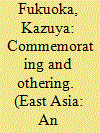|
|
|
Sort Order |
|
|
|
Items / Page
|
|
|
|
|
|
|
| Srl | Item |
| 1 |
ID:
171152


|
|
|
|
|
| Summary/Abstract |
The Yasukuni Shrine in Tokyo, once the symbolic center of national commemoration of war dead in pre-War years, is now regarded as one of the critical conservative symbols of Japan’s imperial past. While the Yasukuni study is expanding, not much has been explored on the nature of public reactions to the controversy. This study explores Prime Minister Abe Shinzo’s Yasukuni pilgrimage in 2013 and delves into Japanese public opinion on and around it. Overall, the Japanese public is relatively composed and prefers cautious approach; yet, at the same time, more people now support the official Yasukuni visits in general. This study also reveals discernible, yet nuanced, disagreements among PM Abe’s Yasukuni policies, the public perceptions of them, and the narratives of major newspaper editorials on this issue. The coverage of public opinion polls by the major national newspapers uncovers the public opinion on (1) the official Yasukuni visit, (2) the idea of building an alternative non-religious national memorial, and (3) the Japanese public’s decreasing sense of affinity toward China and South Korea (and their implications on understanding the Yasukuni issue and the sense of nation). The study will also examine the newspaper narratives on the controversy, which should help exemplify the overall public mood over the years.
|
|
|
|
|
|
|
|
|
|
|
|
|
|
|
|
| 2 |
ID:
161343


|
|
|
|
|
| Summary/Abstract |
Japan’s kyōkasho mondai (history textbook controversy) is at a crossroads. This article tries to exemplify it through the analysis of three issue areas at three levels (international, domestic, and societal). Internationally, the study looks into the failure of much anticipated joint history writing projects with China (2006–2010) and South Korea (2002–2005, 2007–2010). Domestically, this study problematises the recent politicisation of the textbook adoption system through the analysis of the Yokohama and Tokyo cases. The article also discusses the role of Nippon Kaigi (The Japan Conference), an influential rightist lobbying group, in this process. In this conjunction, at the societal level, there seems to have been the growing sense of frustration and resignation with China / South Korea among the Japanese public (i.e. apology fatigue). All these suggest that there has been an underlying change in the landscape of history textbook controversy in Japan, which also cogently shows the on-going practical difficulty in building trustworthy relationships between Japan and China / South Korea. This study tries to offer a contextual understanding about the underlying conditions for (and, hence, the changing societal expectations about) textbook production, content and reception.
|
|
|
|
|
|
|
|
|
|
|
|
|
|
|
|
|
|
|
|
|